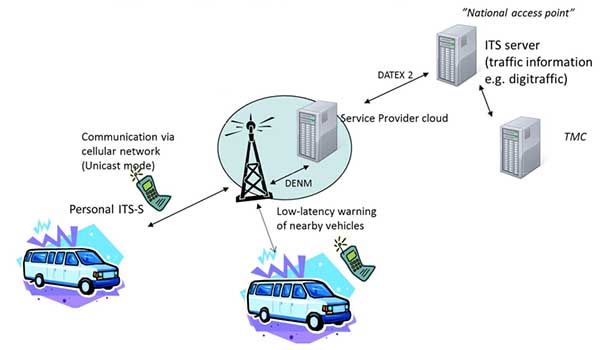The NordicWay Coop-project successfully piloted a service providing safety-related traffic information through cellular networks to road users in Finland. The users received the service well and the service was assessed to reduce accidents and thus have both traffic safety and travel time benefits.
NordicWay
The aim of NordicWay was to test C-ITS over cellular communication on a road corridor stretching from Finland, Norway, Sweden and Denmark. C-ITS stands for cooperative intelligent transport systems, which provide services based on wireless communication between vehicles, road users, infrastructure and back-office systems. The NordicWay project developed a common cloud based architecture to achieve interoperability and continuity of services cross-border. The architecture was piloted in all four countries. The project was co-financed by the Connecting Europe Facility (CEF) programme 2015–2017.

Cellular network based C-ITS service for safety-related traffic information – NordicWay Coop. Illustration: VTT
NordicWay Coop in Finland
NordicWay Coop piloted as part of NordicWay project in Finland a service sending road safety-related minimum universal traffic information messages through cellular networks to road users. In the pilot, the service provided cooperative hazardous location, weather and slipperiness warnings. The pilot proved the technical feasibility of the use of cellular network (3G/4G) for such service: for 90 percent of the warnings, the latency of the warning was less than 0.7 seconds.
User acceptance
The users saw the service as useful, the main benefits of the service was that it provided new and more detailed and targeted information and that with this service, they could also warn other road users of the hazards they had noticed. The users assessed that the warnings influenced their driving behaviour. They said that the service changed their speed, headway, behaviour for overtaking and performing secondary tasks or increased their focus. The service was evaluated with two questionnaires: First impression questionnaire in the beginning of the trial and Final questionnaire (separately for experienced and less experienced users).
Societal benefits
The project assessed the societal impacts for a production phase service with high acceptance. The estimated safety impact was a 0.8–4.6% decrease in injury accidents and a 0.6–4.0% decrease in fatal accidents on all main roads in Finland in the year 2030. The safety impact assessment was based on the nine impact mechanisms (Kulmala 2010). The service will also lead to travel time savings due to the decrease in delays related to accidents. The estimated reduction was 140 000–840 000 hours/year on all main roads in Finland in the year 2030.
Easy deployment
The system is relatively easy to deploy since as the service was implemented on users’ existing mobile phones and other in-vehicle devices. The main challenge for deployment would be therefore to get drivers’ to use the service. If the system is widely penetrated, the benefit-cost ratio can be estimated to 2.3 for the years 2019–2030. The benefits originate to the reduction in accidents and travel times.
Contact:
Ilkka Kotilainen
ilkka.kotilainen@fta.fi
Finnish Transport Agency
 Satu Innamaa
Satu Innamaa
satu.innamaa@vtt.fi
VTT, Finland






Follow us: